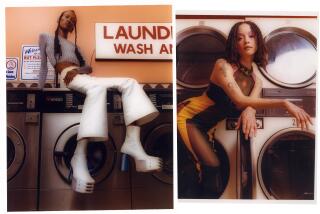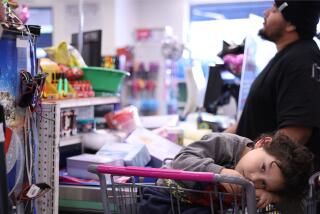Coin Laundry Firm PWS Has National Ambitions
- Share via
Mort Pollack was trying to put his finger on what keeps his business under the radar. “Ever think about a laundry?” he asked me. “Ever want to own one?”
“It’s not a particularly sexy industry,” noted his partner, Eric Steinberg. “It’s stable, solid, but it doesn’t have a lot of bells and whistles.” Then he added, “With our help, that’ll change a bit.”
They were speaking from the Los Angeles headquarters of PWS Laundry, the private company that Pollack, 77, founded 42 years ago with Steinberg’s late father, Bernie. From its beginnings as a local distributor for the Speed Queen brand of washers and dryers, PWS has grown into the largest builder and broker of coin laundries on the West Coast, with revenue of about $100 million annually.
Now it’s pursuing ambitions of going national, applying its proven skill at picking and developing neighborhood sites in California and Nevada to places as far-flung and unfamiliar as Chicago, Houston and Philadelphia.
Demographics are driving this expansion. Steinberg and Pollack say the core clientele of their laundries is Latino, the country’s fastest-growing ethnic group, whose large extended families often live in homes without washing machines. “That’s our market,” Pollack says.
The company’s system is multi-pronged. First, PWS scouts locations for laundries, typically in commercial strips. Steinberg, 56, the company president, signs a lease and deploys teams of designers and subcontractors to build the interior and install the machines. Meanwhile, PWS lines up an owner to take over the property on a turnkey basis -- that is, lock, stock and barrel -- for a down payment of perhaps 40% of the $500,000 to $1-million cost of the construction, lease, permits and equipment.
After the machines’ warranties expire, PWS supplies parts and replacements. If and when the owner wants out, PWS generally serves as broker in the sale of the location, for 10% of the transaction price.
The partners say they have a waiting list of prospective owners attracted by the simplicity of a cash business. “There’s no inventory, no accounts receivables,” says Pollack, who holds the title of chief executive.
Pollack likes to give the impression that -- assuming the proper location is selected, the store is kept clean and the machines maintained -- the business is almost impossible to ruin. This is partially an issue of personal pride, for he is the company expert in the arcane art of selecting the right site. Scouting a proposed location, Pollack will draw a mental circle 1 to 1 1/2 miles in radius around the spot and tour the neighborhood, stopping in at existing coin-ops to judge the competition.
He’ll pop into apartment buildings to see the size of their laundry rooms and the price of a wash. He knows to avoid locations near bars, whose patrons might scare away the women who are the coin-op’s key customers, and dental offices, whose patients take up parking spaces for hours at a time. Fewer than one out of 10 proposed sites meets his standards.
PWS describes coin laundries as classic small bootstrap businesses. The typical owner boasts one to three locations, employing family members as managers. Although some control many more -- among PWS’ largest customers is Sylmar-based Clean King Laundry Systems, a family operator of 20 large coin laundries with aspirations to grow -- the business doesn’t lend itself to a corporate model.
This was proven by the absurd history of a company called SpinCycle, founded in 1995 by a cadre of investors that included people with connections to video giant Blockbuster Inc. SpinCycle set out to revolutionize the industry by blanketing the country with big 5,000-square-foot laundries featuring amenities such as TVs. The company raised more than $150 million in cash and junk-bond debt, leased lavish headquarters space in Scottsdale, Ariz., and assembled a management staff of 1,000.
“These guys didn’t understand the laundry business,” Pollack says. “They felt ... every retail business is like any other. They were racing to create enough revenues to support all this overhead.”
SpinCycle grew to about 200 stores before going bankrupt. PWS acquired the wreckage in 2003 for about 25 cents on the dollar and immediately set about doing to the 172 surviving locations what it knew best: selling them off to individual operators. A group of staff brokers ensconced in what Steinberg calls the “war room” down the hall from his office was close to completing the sale of seven stores last week, bringing the total unloaded to 50; another 35 are in escrow.
At the same time, PWS found another benefit from the SpinCycle acquisition: a strategy for growth. Although Pollack and Steinberg frowned at SpinCycle’s extravagance, they admired the way it spread the gospel of the king-sized coin laundry.
Steinberg in particular is taken with the possibilities. “We want to become a national builder of laundries and to buy up Speed Queen distributorships,” he says. And then? “One could acquire a manufacturer. Or acquire a route to sell and service apartment house laundry rooms. Or go out of the country. China?”
Here Pollack stops him, lest he start booking passage on an overseas flight. “I’ve been out of the country, and I’m not so sure,” he says. “There are close to 40,000 retail coin laundries in the country. California has 10% of that. The rest of this country is just opening for us.”
Golden State appears every Monday and Thursday. You can reach Michael Hiltzik at golden.state@latimes.com and read his previous columns at latimes.com/hiltzik.
More to Read
Inside the business of entertainment
The Wide Shot brings you news, analysis and insights on everything from streaming wars to production — and what it all means for the future.
You may occasionally receive promotional content from the Los Angeles Times.











